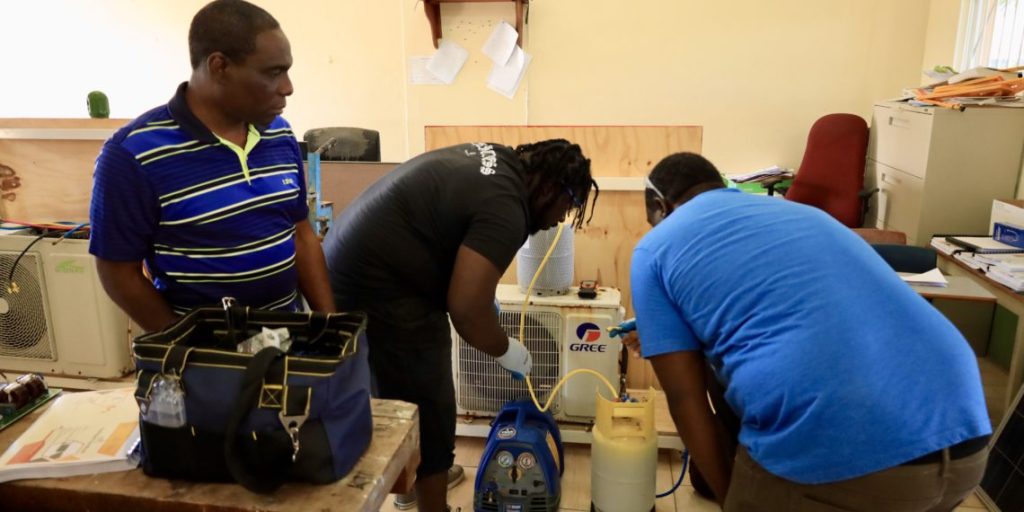Department of Environment Concludes Training Workshop on Good Refrigeration Practices
The Department of Environment in Basseterre, St. Kitts, recently concluded a comprehensive six-day training workshop on “Good Refrigeration Practices,” marking a significant step towards achieving the nation’s sustainability goals and contributing to global environmental protection efforts. Held from February 10th to 15th, 2025, at the Avec Compound, the workshop empowered 22 local technicians with the knowledge and skills necessary to transition to environmentally sound refrigeration and air-conditioning (RAC) practices. This initiative directly aligns with the Federation’s Sustainable Island State Agenda and the international Montreal Protocol’s HCFC Phase-Out Management Plan, both of which aim to reduce and eventually eliminate the use of ozone-depleting substances (ODS). The workshop’s comprehensive curriculum emphasized the detrimental effects of ODS on the ozone layer, public health, and the overall well-being of the planet, underscoring the urgency of adopting sustainable alternatives.
The training program employed a blended learning approach, combining theoretical instruction with practical hands-on exercises to ensure a thorough understanding of sustainable RAC practices. Participants delved into various crucial aspects of the field, including safe handling of equipment, implementing regular maintenance procedures for optimal performance and longevity, and mastering effective refrigerant recovery strategies to minimize environmental impact. This hands-on training provided technicians with real-world experience, enabling them to confidently apply their newly acquired knowledge in their professional practice. By bridging the gap between theory and practice, the workshop ensured that the training translated into tangible skills and a demonstrable improvement in the quality of RAC services within the Federation.
Mrs. Kolene Latham, the National Ozone Coordinator, highlighted the critical role of such training initiatives in building local capacity and fostering a culture of sustainability within the RAC sector. She emphasized the importance of equipping technicians with the necessary expertise to drive the transition towards eco-friendly refrigerants and contribute to both national and international environmental protection efforts. Mrs. Latham stressed that these trained technicians are now at the forefront of climate change mitigation and ozone layer protection within the Federation. Their enhanced skills will directly contribute to a healthier environment and a more sustainable future, demonstrating the tangible impact of investing in capacity building and knowledge transfer.
The workshop culminated in a practical examination, allowing participants to demonstrate their proficiency in the learned skills. Successful completion of the assessment will earn participants certificates of participation, validating their expertise and enhancing their professional credibility. This certification not only recognizes individual achievement but also raises the overall standard of service within the RAC sector, benefiting both consumers and the environment. By promoting certified technicians, the Department of Environment is fostering a culture of professionalism and accountability, ensuring that sustainable practices are effectively implemented across the industry.
The successful completion of the “Good Refrigeration Practices” workshop signifies St. Kitts’ unwavering commitment to its sustainability agenda and its active participation in global environmental efforts. By reducing reliance on harmful refrigerants and promoting the adoption of environmentally friendly alternatives, the program contributes to both national and international strategies to combat climate change and protect the delicate ozone layer. This proactive approach underscores the country’s dedication to creating a sustainable future for its citizens and contributing to the global effort to mitigate the impacts of climate change. The workshop represents a concrete step towards fulfilling these commitments and sets a positive example for other nations to emulate.
The Department of Environment has pledged to continue monitoring and supporting the implementation of sustainable refrigeration practices within the Federation. This ongoing support will ensure that the knowledge and skills gained during the workshop translate into tangible actions and contribute to sustained progress towards a healthier ozone layer and a more sustainable future. This commitment to follow-up and ongoing support is crucial for ensuring the long-term effectiveness of the training program and maximizing its impact on the environment. By providing continuous support and monitoring progress, the Department of Environment will reinforce the importance of sustainable practices and contribute to the long-term protection of the environment.
Share this content:












Post Comment